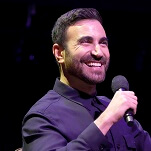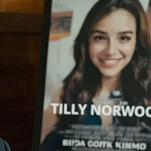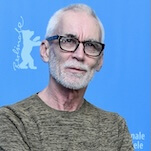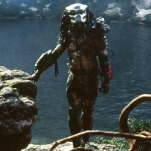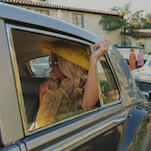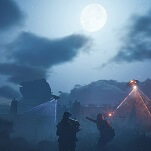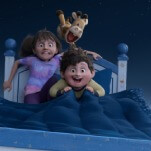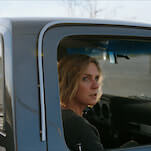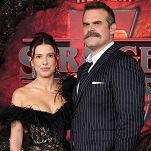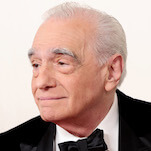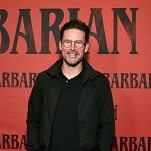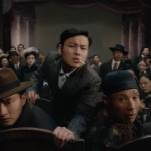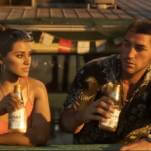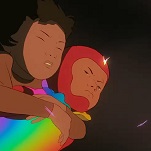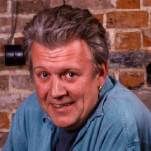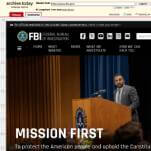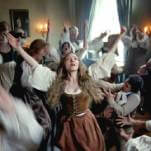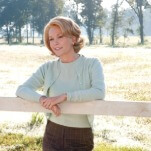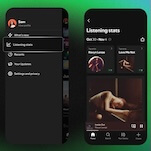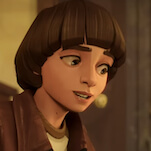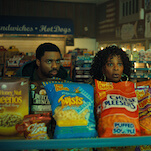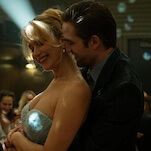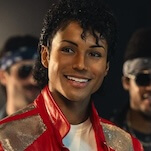AVC: So when the idea came to do the
10-year-anniversary edition of Airplanes, was your reaction
"Wow, that seems like yesterday," or "Wow, that seems like forever ago"?
GB: A little bit of both. A little bit of, "Wow, that
feels like yesterday," because time flies by pretty quickly, but also when I
listen to that record, it takes me back. I remember a lot of my thought
processes when I was 20 or 21, writing those songs and recording that record.
When I look at that record, I wonder what I was thinking when I was trying to
say a particular thing—or if I thought I was saying one thing, and it
wasn't coming too clearly at all. I hear some of the weird little nuances in
the recording; I can hear what the room sounded like. I remember what it
smelled like. I can remember sitting up in [guitarist] Chris Walla's bedroom
hearing those songs through the speakers and being really proud of ourselves,
and for the first time in my life having this realization like, "Maybe I can do
this. Maybe I can make music that in some capacity people will enjoy and come
see me play."
Making that record was so much fun, and there was
no context or pretense for what we were going to be able to accomplish, or how
long we'd even be doing this. It was as innocent a time as a band could have,
and I think we all look back to our more innocent moments and we long for some
semblance of that feeling. I put it on and I'm instantaneously taken back, but
also I'll take things a little bit more critically now, like, "What did I think
I was saying in that song? What is this song about?" I thought the lyrics were
incredibly descriptive, and now they sound really cryptic and weird. I'd like
to also think that when I listen to those songs that I'm proud of my
development as a writer. I don't think I was doing anything poorly at that
time, but I can certainly see how my writing has changed.
AVC: What do you think has changed about your
writing since then? I assume you think it's gotten stronger.
BG: I wouldn't put that to a vote. I'm sure some
people think it has gotten a lot better. I'm sure some people think it's gotten
a lot worse, depending on what era of the band is your favorite. If there is
one thing I think I have accomplished, it's that I always thought of myself as
a very literal songwriter, and as I look at some of those older records, I
don't hear it now the way I did when I was 20. I think it is undeniable that
the songs have become more instantaneously descriptive and literal. I'd like
the songs to be more storytelling, but also have the turns of phrase within
them that would hopefully distance my writing from the pack. I feel like on
those older records, certainly on Airplanes, there are a lot of
attempts at clever turns of phrase.
AVC: What else do you remember about the actual
recording?
BG: Chris was working at Starbucks; he owned stock in
Starbucks. I don't know if it is still the same, but at the time, you had stock
options if you were a barista. He had like $1,000. We knew we were going to
record an album, and we needed to have a good microphone, so we cashed out his
stocks. We went down to the bank and got like $1,000 in cash, and we went to
Pacific Pro Audio in Seattle and bought an AKG 414 microphone, which at the
time was seemingly an exorbitant amount of money to spend on a microphone.
$1,000 on a microphone is a lot of money even now—at the time, it was
insane. That microphone went on everything—on top of the drums, on the guitar,
on the vocals. When we went to get the money, Chris and I were at the bank, and
we're pretty scrappy-looking. We're 20 or 21. The lady behind the counter is
making conversation, like, "Oh, are you buying a car?" Chris matter-of-factly says,
"No, we're buying a microphone," as if she was crazy for asking. She looked at
us like we were fucking with her. No one spends $1,000 on a microphone.
I was still in school at the time; Chris and I
lived together, and we had a roommate who was also finishing his last year of
college. Every day after class or work, we would meet at the house and start
recording. Our roommate would come home and open the front door and maybe ruin
a take, or see that we were in the midst of recording and get pissed and storm
up to his room since we were taking over the entire house trying to make the
record. It's funny to look back on that period knowing what I know now, and
realizing how silly it was, and also how innocent and fun it was. It was a
really fun time.
AVC: It would probably be a really different
record if you'd had some money and went to a studio—and probably not for
the better.
BG: I don't think so either. There were two recording
studios in Bellingham. One was really expensive, a "nice studio." We were at the
point where we were young and irreverent. We would scoff at the idea of a nice
studio. "Why would you want to go to a nice studio? Oh wow, they have really
expensive gear. Ooh, that's really fancy. Well we've got an eight-track. We've
got it going on here." Now that we have the resources, we're like, "Oh wow, a
nice studio is pretty nice! They do have nice outboards here. It's actually a
pretty good place." I know [bassist] Nick [Harmer] has some video footage from
us recording that record. I don't think it has ever surfaced, or would be
usable in any capacity, but it's funny how much changes so quickly.
AVC: Where did the title come from? I always
assumed that it was "Let's just call it something about airplanes," and that
actually became the title.
BG: I had a girlfriend at the time who was an
elementary-school teacher. She had this little questionnaire she was giving to
her kids, like, "What would you like to learn more about?" Some kid wrote in,
"Something about airplanes." That was his answer. He wanted to learn something about airplanes. For the
first couple albums, Death Cab For Cutie was wrought with non sequiturs. I
think the only band in recent years to beat us with the frequency of non
sequiturs is Minus The Bear. The first couple records were pretty wrought with
song titles that had nothing to do with the songs, and album titles that had
nothing to do with the albums. Looking back and kind of psychoanalyzing that, I
think that had to do with our insecurities. We could just give it a weird name and
move on and not have to think about it anymore. We Have The Facts And We're
Voting Yes came
from a thrift-store T-shirt that our friend found. It's funny how that has
changed. It went from anything being the title of the record to now, where we
had to have a committee to name Narrow Stairs. The attention to those
kinds of details has changed over the years.
AVC: Sean Nelson wrote in the liner notes that
you were "blissfully, beautifully un-ambitious," which doesn't seem entirely
accurate. It doesn't seem like you were careerist, but you were at least
putting yourselves out there. You would go out in the van to places where you
were unknown.
BG: I hate revisionist history when it comes to the
punk-rock story, certainly. That is my least favorite type of revisionist
history. I guess we didn't really have any read on what our ambitions even were
until we had been in the van for three or four years. All those early tours
were like, "Well, we've got to go on tour. We have to do a national tour. We
have to go down the West Coast four times and play to five people every time
we're in L.A." I don't like to think of it as a level of ambition that we had.
I look back at those early tours and those first couple years, and it was more
that we didn't want to go work. I didn't want to work at the refinery. I didn't
want to go to my temp job. I wanted to climb in a van and have a 10-day
vacation with my three best friends that involved playing music at teen centers
to fucking 20 people. Anything was better than going to work. All those early
tours before we made any money were more like vacations. I don't think it was
until 2001 that we pulled our heads out of the sand and were like, "What are we
doing?" I don't think Chris realized he was in a band until 2001. He all of a sudden
woke up one day and realized he was in a band. He thought he was just recording
my solo project. Three albums later, we're in Baltimore trying to figure out
what to do with ourselves.
AVC: Was that when things tipped? Later in
2001, on The Photo Album tour, seemed like a big turning point.
BG: I think so. We Have The Facts and The Forbidden Love
EP were
when the indie-rockers first got clued into it, and The Photo Album sort of tipped it away
from a hipster crowd and more toward regular people, so to speak. 2001 was a
weird year for us. We had gotten our first royalty checks from Barsuk in fall
of 2000 for what amounted to like $4,000 or $5,000 per person. It was not a lot
of money, but it was enough that we eventually looked at each other and were
like, "All right, here we go. My temp job just ran out, and I've got $4,000. As
long as we're on tour by March, we can make this happen."
While I'm proud of every record we've done, it's
my opinion that The Photo Album is the weakest record, because we were making an
album so we could be on tour in the fall. For the first time in our careers, we
found ourselves with an economic incentive to be on the road and to be making
albums. We had cut ourselves free from the security of day-job life. The goals
became primarily financial, at least for a while. That was the roughest time we
had ever had as a band, because that was the first moment we realized that this
was for real. We were not goofing around anymore. We all threw everything we
had into this in a way where we all found ourselves really far from home, and
we were stuck with each other. It took some time to figure out how we were
going to move forward from that point.
The story of our band is that we were this
relentless touring band in those early years. We were leaving day jobs and
going off on the road and having fun and seeing the country for the first time.
We were going to cities we'd never played before. We were playing Chinese
restaurants and basements and record stores and houses. We were crashing on
floors and it was all new and exciting. It was like a vacation. It didn't feel
like work. It didn't feel like touring the way touring feels now. We tour in
far more luxury and with far more resources than we could have dreamed of
having 10 years ago, but at the same time, it's all a known quantity at this
point. It wasn't back then. Every time we got on the highway, we were seeing
new stuff and meeting new people and making new friends. I couldn't wait to go
on tour back then. I would be sitting at my day job or my apartment, just
itching to go. There were so many adventures that were about to happen.
AVC: It sounds like you miss it.
BG: I don't necessarily miss it. I'm glad I had it. I
guess I would say I miss it the way anyone misses their more innocent periods.
You look back at a time you idealize now and you only remember the good stuff.
You tell the stories about the hard stuff and just laugh about it now. You
don't remember how difficult it was to be stranded in Austin after driving 52
hours from Seattle in a rainstorm and having nowhere to stay for five hours.
You remember that stuff and laugh about it now. You don't feel it the way you
did back then when you were so scared and nervous and tired and hungry. We
always idealize the past because we don't feel the painful stuff the way we
used to.
AVC: Did listening to the live bonus disc bring
back any of those weird memories?
BG: I can hear the way Nathan [Good, original DCFC
drummer] played. I can remember how I sang—a little more nasal-y back
then. Listening to those old recordings is like seeing a photograph of yourself
from 10 years ago. You're wearing what you thought looked cool at the time. You
had your hair styled the particular way you thought looked cool. It's an
accurate depiction of who you were and what you looked and sounded like at that
point in your life. It doesn't necessarily mean that it aged in a way that it
feels as cool or sounds as good to you, or says what you thought it said, 10
years later. That's just the nature of growing older.
AVC: That seems like almost the last point in
history when a band could develop off the radar, pre-Internet insanity. Do you
feel like that was a lucky thing for you?
BG: I think so. I feel very blessed to have had that
relatively gradual build. That type of growth just isn't possible anymore. But
I think bands who are in their early 20s today, who are putting out their first
records, they are living in their own time and they have a series of parameters
they have to work around. Ten years ago, our reality was spending a lot more
time in obscurity before anyone really knew who we were. I don't feel like I
have any real advice to give anybody who is starting a band today, because the
playing field has changed so drastically. I don't think the way we were able to
build was necessarily any better or worse than how people try to form careers
now. One of my favorite quotes is a Mike Watt quote when he says, "You know,
not everyone has the ability to be born at the same time." We wanted to be like
R.E.M., but the reality is that 15 years after R.E.M. was putting out those
records, the playing field had changed drastically as well.
AVC: What's next? Are you writing new songs
already?
BG: Not really. We've been on the road so much and
out promoting this record. One of the things I enjoyed about the last record
was that I was able to do all this touring and promoting and then go flip off
into my own little corner of the world and write in a vacuum, then bring all
the songs to the band. That's what I want to do this time. I don't have any
large concepts about what the new album should be or sound like. I just want to
get home at some point and be able to spend some time with the guitar and try
to write the songs.

